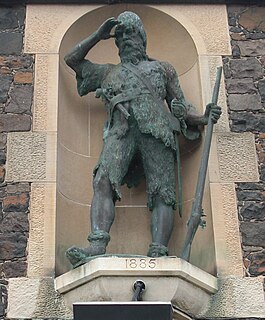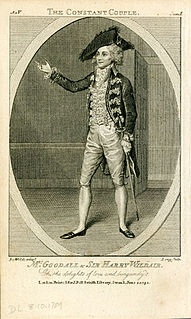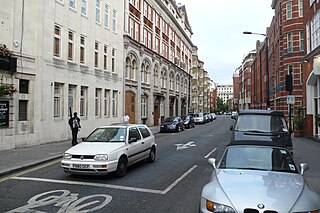
Alexander Selkirk was a Scottish privateer and Royal Navy officer who spent four years and four months as a castaway (1704–1709) after being marooned by his captain on an uninhabited island in the South Pacific Ocean. He survived that ordeal, but succumbed to tropical illness a dozen years later while serving aboard HMS Weymouth off West Africa.

Joseph Addison was an English essayist, poet, playwright, and politician. He was the eldest son of The Reverend Lancelot Addison. His name is usually remembered alongside that of his long-standing friend, Richard Steele, with whom he founded The Spectator magazine.

Sir Godfrey Kneller, 1st Baronet, was the leading portrait painter in England during the late 17th and early 18th centuries, and was court painter to English and British monarchs from Charles II to George I. His major works include The Chinese Convert ; a series of four portraits of Isaac Newton painted at various junctures of the latter's life; a series of ten reigning European monarchs, including King Louis XIV of France; over 40 "kit-cat portraits" of members of the Kit-Cat Club; and ten "beauties" of the court of William III, to match a similar series of ten beauties of the court of Charles II painted by his predecessor as court painter, Sir Peter Lely.

Colley Cibber was an English actor-manager, playwright and Poet Laureate. His colourful memoir Apology for the Life of Colley Cibber (1740) describes his life in a personal, anecdotal and even rambling style. He wrote 25 plays for his own company at Drury Lane, half of which were adapted from various sources, which led Robert Lowe and Alexander Pope, among others, to criticise his "miserable mutilation" of "crucified Molière [and] hapless Shakespeare". He regarded himself as first and foremost an actor and had great popular success in comical fop parts, while as a tragic actor he was persistent but much ridiculed. Cibber's brash, extroverted personality did not sit well with his contemporaries, and he was frequently accused of tasteless theatrical productions, shady business methods, and a social and political opportunism that was thought to have gained him the laureateship over far better poets. He rose to ignominious fame when he became the chief target, the head Dunce, of Alexander Pope's satirical poem The Dunciad.
This article presents lists of the literary events and publications in 1714.

Michael John Pratt was an English actor, musician, songwriter and screenwriter, known for his work on British television in the 1960s and 1970s.

The Spectator was a daily publication founded by Joseph Addison and Richard Steele in England, lasting from 1711 to 1712. Each "paper", or "number", was approximately 2,500 words long, and the original run consisted of 555 numbers, beginning on 1 March 1711. These were collected into seven volumes. The paper was revived without the involvement of Steele in 1714, appearing thrice weekly for six months, and these papers when collected formed the eighth volume. Eustace Budgell, a cousin of Addison's, and the poet John Hughes also contributed to the publication.

Richard Pococke was an English prelate and anthropologist. He was the Bishop of Ossory (1756–65) and Meath (1765), both dioceses of the Church of Ireland. However, he is best known for his travel writings and diaries.
William Charles Common Steele also known as Billy Steele, is a former Scotland international rugby union player.
Richard Cresswell (1688–1743) was an English politician.
Michael Roland Steele-Bodger CBE is a former English rugby union footballer who played flanker for Harlequins, England and the Barbarians, and is currently the President of the Barbarian Football Club and President of the East India Club, London.

Jason Sean Steele is an English professional footballer who plays as a goalkeeper for Premier League club Brighton & Hove Albion. A product of Middlesbrough's youth academy, he has represented England at all youth levels, as well as appearing for the Great Britain Olympic team.
James Bucknall Bucknall Estcourt (1803-1855), was a major-general and MP.
Events from the year 1704 in Ireland.
William Harrison (1685–1713) was an English poet and diplomat.
The Tatler was a British literary and society journal begun by Richard Steele in 1709 and published for two years. It represented a new approach to journalism, featuring cultivated essays on contemporary manners, and established the pattern that would be copied in such British classics as Addison and Steele's Spectator, Samuel Johnson's Rambler and Idler, and Goldsmith's Citizen of the World, and influence essayists as late as Charles Lamb and William Hazlitt. Addison and Steele liquidated The Tatler in order to make a fresh start with the similar Spectator, and the collected issues of Tatler are usually published in the same volume as the collected Spectator.

William Pinkethman (c.1660–1725) was an English comic actor in the droll style. He was considered an imitator of Anthony Leigh.

Sentimental comedy is an 18th-century dramatic genre which sprang up as a reaction to the immoral tone of English Restoration plays. In Sentimental comedies middle-class protagonists triumphantly overcome a series of moral trials. These plays aimed to produce tears rather than laughter and reflected contemporary philosophical conceptions of humans as inherently good but capable of being led astray by bad example. By appealing to his noble sentiments, a man could be reformed and set back on the path of virtue. While the plays contained characters whose natures seemed overly virtuous and whose problems were too easily resolved, they were accepted by audiences as truthful representations of the human predicament.
The public domain consists of all the creative works to which no exclusive intellectual property rights apply. Those rights may have expired, been forfeited, expressly waived, or may be inapplicable.

The Encyclopædia Britannica Eleventh Edition (1910–11) is a 29-volume reference work, an edition of the Encyclopædia Britannica. It was developed during the encyclopaedia's transition from a British to an American publication. Some of its articles were written by the best-known scholars of the time. This edition of the encyclopedia, containing 40,000 entries, is now in the public domain, and many of its articles have been used as a basis for articles in Wikipedia. However, the outdated nature of some of its content makes its use as a source for modern scholarship problematic. Some articles have special value and interest to modern scholars as cultural artifacts of the 19th and early 20th centuries.















